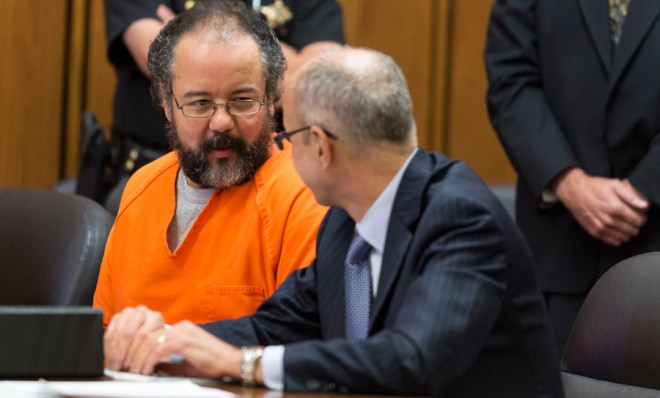4 revelations from the Ariel Castro interrogation tape
The confessed rapist and kidnapper was nearly caught more than once


A free daily email with the biggest news stories of the day – and the best features from TheWeek.com
You are now subscribed
Your newsletter sign-up was successful
Three days after convicted kidnapper and rapist Ariel Castro, 53, hanged himself in his prison cell, NBC News on Friday aired police interrogation tapes it obtained in which Castro told detectives how he managed to hold three women captive in his Cleveland home for a decade.
Out of respect for the victims — Amanda Berry, Michelle Knight, and Gina DeJesus — NBC did not show any parts of the four hours of video in which Castro discussed what he did to the women. The network did, however, air excerpts in which he revealed new details about how close he came to being caught.
1. School security cameras could have linked him to one abduction
The Week
Escape your echo chamber. Get the facts behind the news, plus analysis from multiple perspectives.

Sign up for The Week's Free Newsletters
From our morning news briefing to a weekly Good News Newsletter, get the best of The Week delivered directly to your inbox.
From our morning news briefing to a weekly Good News Newsletter, get the best of The Week delivered directly to your inbox.
One of the first new details to emerge from the tapes was his surprise that he got away with the April 2004 kidnapping of DeJesus, then just 14 years old. Castro told investigators that surveillance cameras at the girl's middle school should have captured images of him 15 minutes before he abducted her, so he was certain police would link him to her disappearance. "You could have broke the case right then and there," he said.
2. Castro called Amanda Berry's mother
Castro also said he had used Berry's cell phone to call her mother, who died in 2006. He told her that her daughter was unharmed, and was now his wife. "I hung up so we didn't have a conversation," he said. The statement appeared to confirm an earlier report from CBS affiliate WOIO that Berry's mother, Louwanna Miller, had said someone called her from her daughter's cell phone a week after she was kidnapped.
3. Castro's girlfriend almost discovered his first victim
A free daily email with the biggest news stories of the day – and the best features from TheWeek.com
Castro's first close call came before he kidnapped Berry and DeJesus. He told detectives that an old girlfriend heard a TV blaring from the room where he had imprisoned Knight, his first victim, not long after he abducted her in 2002. "She seen that I had a TV on in the upstairs room. And she says, 'What is that? You have a TV on up there?'" Castro said. "And my heart started beating, and I was like, 'Okay, she's probably catching onto something."
4. The women's ordeal ended because Castro left a door open
Berry managed to call for help on May 6 and get neighbors to help her escape with her daughter, who was fathered by Castro. Police promptly came and freed Knight and DeJesus, too. The rescue might never have happened had Castro not left a bedroom door open, allowing Berry to get to the front door. "I know I let my guard down," Castro said.
Watch NBC's report below:
Visit NBCNews.com for breaking news, world news, and news about the economy
Harold Maass is a contributing editor at The Week. He has been writing for The Week since the 2001 debut of the U.S. print edition and served as editor of TheWeek.com when it launched in 2008. Harold started his career as a newspaper reporter in South Florida and Haiti. He has previously worked for a variety of news outlets, including The Miami Herald, ABC News and Fox News, and for several years wrote a daily roundup of financial news for The Week and Yahoo Finance.
